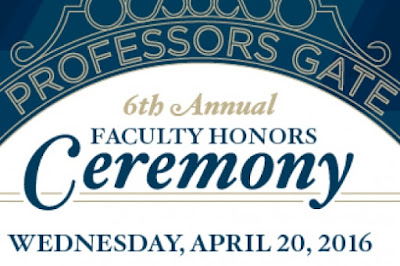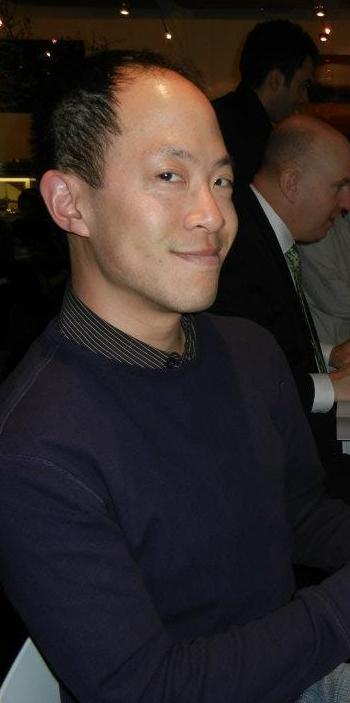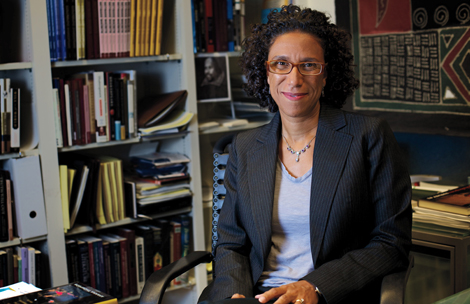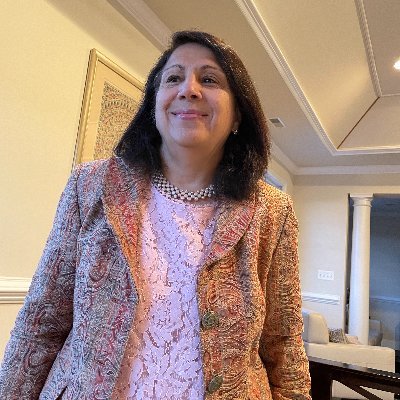Congratulations to English Professor Daniel DeWispelare and PhD Candidate Vicki Barnett Woods, who have both won awards for excellence within the Writing In the Disciplines program! They will be recognized for their accomplishments in the university-wide Faculty Honors Ceremony, on April 20th at 4:00 pm in the Jack Morton Auditorium, and will receive a plaque and public commendation.
 Professor Daniel DeWispelare, who received his PhD in Comparative Literature and Literary Theory at the University of Pennsylvania, is the recipient of the 2015-16 WID Best Assignment Design award for his conference paper assignment in Critical Theory, the class formerly known as Critical Methods.
Professor Daniel DeWispelare, who received his PhD in Comparative Literature and Literary Theory at the University of Pennsylvania, is the recipient of the 2015-16 WID Best Assignment Design award for his conference paper assignment in Critical Theory, the class formerly known as Critical Methods. In his course, he sequenced assignments around the method of proposing, writing, and performing a conference presentation. He explained that students modulated shorter argumentative assignments into a final, cohesive paper. His assignments required students to work with multiple source types, and to imaginatively engage with specific quotations.
 The committee noted the excellent choice of engaging materials, and carefully structured rubrics that delineated key rhetorical moves and structures. This course covered a broad range of readings from The Norton Anthology of Criticism,as well as featuring contemporary works, including Professor David Mitchell’s recently published The Biopolitics of Disability.
The committee noted the excellent choice of engaging materials, and carefully structured rubrics that delineated key rhetorical moves and structures. This course covered a broad range of readings from The Norton Anthology of Criticism,as well as featuring contemporary works, including Professor David Mitchell’s recently published The Biopolitics of Disability.
The mock conference assignment generated student work spanning pop culture, film and visual art, literary works, and critical and theoretical insights. Applying critical theory to a multiplicity of disciplines and mediums made it more accessible and engaging, which appealed to the range of majors in the class. Thus, students were able to create a horizon-broadening and synergistic learning experience that mirrored real-life academia.
The premise of performing mastery of a single topic was antithetical to the very nature of the class, so the wide range of presentation topics was an appropriate reflection of the course. The conference generated opportunities to practice modes of public, oral presentation by exchanging ideas with classmates who have shared readings and assignments. Ultimately, students learned to analyze the components of texts and discern how they come together and unfold.
Professor DeWispelare received the committee’s praise for this assignment’s success in engaging students by paralleling the process of actual scholarly work. In the end-of-semester conference, students presented 5-10 minute papers and were put into panels based on common themes, inviting generative critical conversation. This was the highlight of the semester, and not only allowed students to access each other’s work, but also provided a sort of Meta reflection on the nature and experience of the course itself.
Not only was the department impressed with the quality of Professor DeWispelare’s pedagogy, but the quality of his comments and feedback on student work also showcase his commitment to student growth, a sentiment echoed in letters from students who recalled numerous generative conversations. His advice to future students: “Stay curious.”
Vicki Barnett Woods, a third year English PhD candidate, is the recipient of the 2015-16 WID Distinguished Graduate Student Teaching Award for a Business Writing class. The contrast between her first pedagogical experience teaching ESL to Phillipino farmers with the Peace Corps in a rural, impoverished country, and then later a top tier business school, has shown her the huge spectrum of what a classroom can look like.
Vicki described the brand-new Business Writing course as a “weird situation that turned into a great opportunity.” The skeletal guidelines and the shift from 20 to 200 students necessitated designing an entirely new curriculum to streamline and bring Business Writing to scale.
The committee commended Vicki for innovatively balancing individual students’ roles as writers and researchers. The assignments, which included a memo, argumentative essay, executive summary, senatorial report, and Op Ed, were built to scaffold into an integrative, dynamic group project at end of semester. These varied genres encompassed different rhetorical components that circle around the Federal regulatory process.
Teaching fundamental rhetorical and composition writing skills within the arena market of politics has broadened Vicki’s skill set a scholar, and has helped her see the flexibility of writing as she learns about the content along with her students. “As a technology of communication,” she say, “writing can be a very flexible mode that shifts, changes, moves, and alters.”
Vicki emphasized the importance of developing a rapport with students starting in the beginning of semester, and treating the entire course as a joint journey. Developing a sense of community is incredibly important for how the semester plays out. When she’s with her students, she is always on their side, guiding them like an “older, wiser sister,” a fitting description considering the narrow age gap that helpfully allows her to speak to them in their mode of understanding.
Students becoming better writers, committing to tasks, and producing good work are goals that she knows will not be accomplished by “being combative or a dictator- that’s not in my personality. Working with them is a deep-seated investment not just in one singular moment, but every day, every class, every email.”
Vicki has some excellent words of wisdom for students:
“Know what your routine is. For projects like dissertations, there is no way you will successfully execute a 200 page page document in 2 weeks. People think they are this, person but they are not. Allow yourself periods to feel stress, but also know where your boundaries are and that it’s ok to say no to things. Micro management, having weekly quotas and sticking to them, and avoiding procrastination are crucial. Stay accountable to yourself- no one else will hold you to it.”
 Professor Daniel DeWispelare, who received his PhD in Comparative Literature and Literary Theory at the University of Pennsylvania, is the recipient of the 2015-16 WID Best Assignment Design award for his conference paper assignment in Critical Theory, the class formerly known as Critical Methods.
Professor Daniel DeWispelare, who received his PhD in Comparative Literature and Literary Theory at the University of Pennsylvania, is the recipient of the 2015-16 WID Best Assignment Design award for his conference paper assignment in Critical Theory, the class formerly known as Critical Methods.  The committee noted the excellent choice of engaging materials, and carefully structured rubrics that delineated key rhetorical moves and structures. This course covered a broad range of readings from The Norton Anthology of Criticism,as well as featuring contemporary works, including Professor David Mitchell’s recently published The Biopolitics of Disability.
The committee noted the excellent choice of engaging materials, and carefully structured rubrics that delineated key rhetorical moves and structures. This course covered a broad range of readings from The Norton Anthology of Criticism,as well as featuring contemporary works, including Professor David Mitchell’s recently published The Biopolitics of Disability. 









